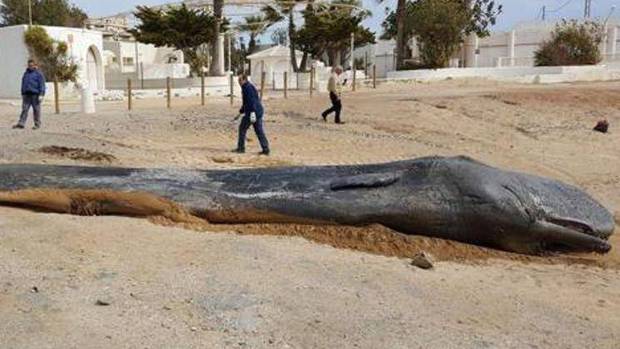
Dead sperm whale found with 30 kilograms of trash in digestive system.
During an autopsy on the 10-metre long marine mammal, experts found plastic bags, fragments of nets and ropes and a jerry can.
The body of the young male was found on a beach at Cabo de Palos in Murcia in February.
Experts from the El Valle Wildlife Recovery Center who analysed the remains, concluded the whale had died because its digestive system became blocked and it was unable to expel the plastic it had swallowed.
This caused the whale to develop peritonitis, an infection of the abdomen, which ultimately led to its death.
The finding has prompted the regional ministry of culture, tourism and environment to launch an awareness campaign on the danger of marine litter for wildlife.
“The presence of plastics in seas and oceans is one of the greatest threats to the conservation of wildlife throughout the world, since many animals are trapped in the trash or ingest large amounts of plastics that end up causing their death,” said Consuelo Rosauro, director-general of the natural environment in the Murcian government.
“The region of Murcia is no stranger to this problem, which we must tackle through clean-up actions and, above all, citizen awareness.”
A recent report for the UK government concluded the amount of plastic in the world’s oceans is set to treble within a decade.
While scientists are still unsure about the extent of the harm to marine ecosystems caused by the huge quantities of plastic circulating the world’s oceans, many animals have been documented eating and becoming tangled in plastic.
Other whales have previously been found washed up with stomachs full of plastic, and a study released in February concluded tiny fragments of plastic termed “microplastics” pose a “major threat” to whales and sharks.
Blue Planet II brought these issues to the world’s attention with heart-breaking footage that appeared to show whales dying as a result of exposure to plastic pollution.
A recent report from the Centre for Environment, Fisheries and Aquaculture Science (Cefas) suggested the number of plastic bags in UK waters had decreased as a direct result of measures to tackle plastic waste.
A 5p charge added to all carrier bags has been credited with driving a 80 per cent drop in their use across the country.
“It is encouraging to see that efforts by all of society, whether the public, industry, NGOs or government to reduce plastic bags are having an effect,” said Dr Thomas Maes, a marine litter scientist at Cefas.













